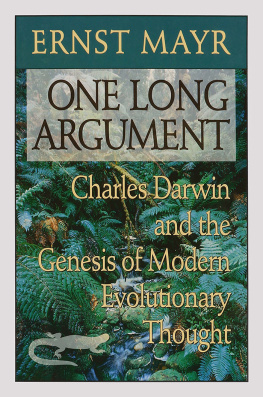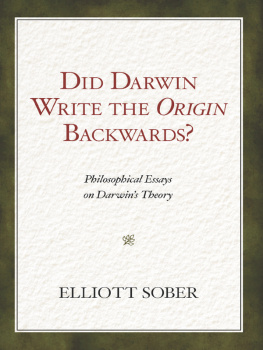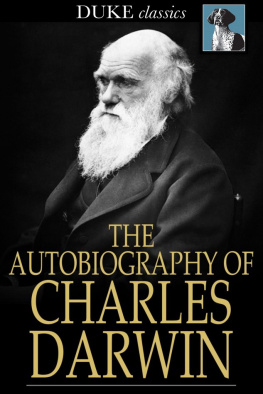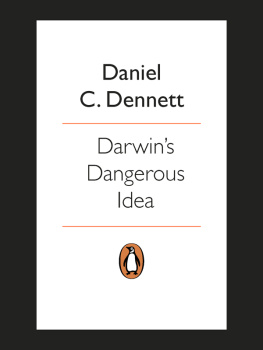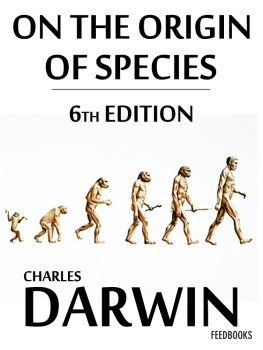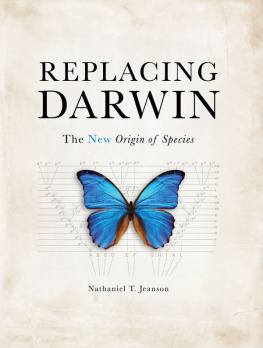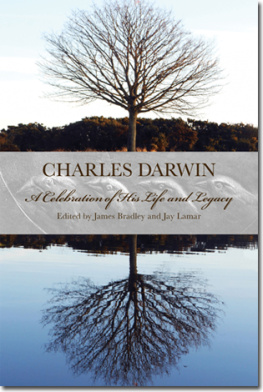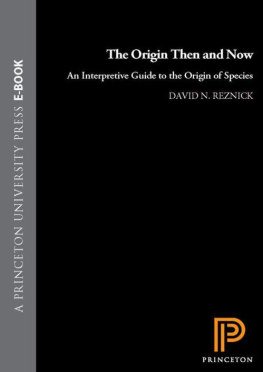E Mayr - One Long Argument - Charles Darwin & the Genesis of Modern Evolutionary Thought (Cobee) (Paper) (Questions of Science): Charles Darwin and the Genesis of Modern Evolutionary Thought: 2
Here you can read online E Mayr - One Long Argument - Charles Darwin & the Genesis of Modern Evolutionary Thought (Cobee) (Paper) (Questions of Science): Charles Darwin and the Genesis of Modern Evolutionary Thought: 2 full text of the book (entire story) in english for free. Download pdf and epub, get meaning, cover and reviews about this ebook. year: 1993, publisher: Harvard University Press, genre: Science. Description of the work, (preface) as well as reviews are available. Best literature library LitArk.com created for fans of good reading and offers a wide selection of genres:
Romance novel
Science fiction
Adventure
Detective
Science
History
Home and family
Prose
Art
Politics
Computer
Non-fiction
Religion
Business
Children
Humor
Choose a favorite category and find really read worthwhile books. Enjoy immersion in the world of imagination, feel the emotions of the characters or learn something new for yourself, make an fascinating discovery.
- Book:One Long Argument - Charles Darwin & the Genesis of Modern Evolutionary Thought (Cobee) (Paper) (Questions of Science): Charles Darwin and the Genesis of Modern Evolutionary Thought: 2
- Author:
- Publisher:Harvard University Press
- Genre:
- Year:1993
- Rating:4 / 5
- Favourites:Add to favourites
- Your mark:
One Long Argument - Charles Darwin & the Genesis of Modern Evolutionary Thought (Cobee) (Paper) (Questions of Science): Charles Darwin and the Genesis of Modern Evolutionary Thought: 2: summary, description and annotation
We offer to read an annotation, description, summary or preface (depends on what the author of the book "One Long Argument - Charles Darwin & the Genesis of Modern Evolutionary Thought (Cobee) (Paper) (Questions of Science): Charles Darwin and the Genesis of Modern Evolutionary Thought: 2" wrote himself). If you haven't found the necessary information about the book — write in the comments, we will try to find it.
Evolutionary theory ranks as one of the most powerful concepts of modern civilization. Its effects on our view of life have been wide and deep. One of the most world-shaking books ever published, Charles Darwins On the Origin of Species, first appeared in print over 130 years ago, and it touched off a debate that rages to this day.
Every modern evolutionist turns to Darwins work again and again. Current controversies in the life sciences very often have as their starting point some vagueness in Darwins writings or some question Darwin was unable to answer owing to the insufficient biological knowledge available during his time. Despite the intense study of Darwins life and work, however, many of us cannot explain his theories (he had several separate ones) and the evidence and reasoning behind them, nor do we appreciate the modifications of the Darwinian paradigm that have kept it viable throughout the twentieth century. Who could elucidate the subtleties of Darwins thought and that of his contemporaries and intellectual heirs--A. R. Wallace, T. H. Huxley, August Weismann, Asa Gray--better than Ernst Mayr, a man considered by many to be the greatest evolutionist of the century? In this gem of historical scholarship, Mayr has achieved a remarkable distillation of Charles Darwins scientific thought and his enormous legacy to twentieth-century biology. Here we have an accessible account of the revolutionary ideas that Darwin thrust upon the world. Describing his treatise as one long argument, Darwin definitively refuted the belief in the divine creation of each individual species, establishing in its place the concept that all of life descended from a common ancestor. He proposed the idea that humans were not the special products of creation but evolved according to principles that operate everywhere else in the living world; he upset current notions of a perfectly designed, benign natural world and substituted in their place the concept of a struggle for survival; and he introduced probability, chance, and uniqueness into scientific discourse. This is an important book for students, biologists, and general readers interested in the history of ideas--especially ideas that have radically altered our worldview. Here is a book by a grand master that spells out in simple terms the historical issues and presents the controversies in a manner that makes them understandable from a modern perspective.E Mayr: author's other books
Who wrote One Long Argument - Charles Darwin & the Genesis of Modern Evolutionary Thought (Cobee) (Paper) (Questions of Science): Charles Darwin and the Genesis of Modern Evolutionary Thought: 2? Find out the surname, the name of the author of the book and a list of all author's works by series.

